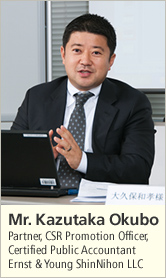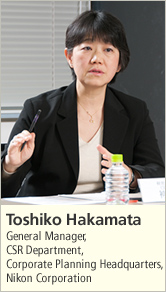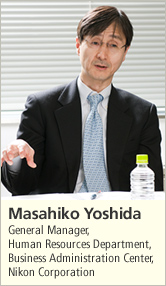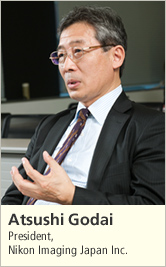Stakeholder Dialogue
A company that cannot promote the advancement of women in the workplace will also find it hard to promote other types of diversity!
—Identifying issues with the current state of Nikon's efforts to promote the advancement of women in the workplace—

Okubo: The aim of today's stakeholder dialogue is to seek the advice of external experts in presenting specific problem areas at Nikon in the hope that this will lead to clues for finding solutions to these problems. I guess the key words for today are the diversification of value and markets, plus innovation. To begin with, I will ask the experts to present their views on any existing issues at Nikon.
Atsumi: At present, Nikon Corporation has better work-life balance arrangements than most other companies in Japan, but the level of females appointed to managerial positions is relatively low. Overseas, and particularly in Europe, there has been a push to require companies to achieve a certain ratio of female officers. For companies like Nikon, which are expanding their global presence, any delay in efforts for diversity could handicap their business in the future.
Akiyama: I believe that diversity is the foundation of management. I see a good manager primarily as someone who ascertains the character differences of each of his/her workers, and who can enable them to reach their natural potential. I think that such an environment engenders innovation, and this leads to increased competitiveness for the whole company.
Okubo: Looking from within Nikon, what do you see as the issues for promoting the advancement of women in the workplace?

Hakamata: Led by the CSR Committee, Nikon has been committed to promoting the advancement of women in the workplace for six years. Recently, various systems have been set up which provide support for workers caring for their children or other family members. Although these activities need to be rolled out globally, at present, they are limited to Nikon Corporation and five Group companies in Japan. Considering that it has been six years, this is slow. In order for these activities to expand to other Group companies, the whole Group needs to recognize this as a common challenge.
Godai: When it comes to staffing plans such as the number of new recruits, Group companies like ours are strongly influenced by the parent company, Nikon Corporation. In addition to promoting the advancement of women in the workplace, at the same time, we must also consider how people with diverse backgrounds, such as those with different employment patterns and past careers, can play an active part in the company. This will lead to revitalization within the company.
Wakamiya: Although my workplace seems to have a relatively large number of females, it is mostly the male employees who get temporarily transferred overseas for instance. I wonder why this is.
Atsumi: My way of thinking is that: Females are a majority among minorities. In a workplace where not even females can take an active part, it would be difficult to promote diversity for other minorities, such as for non-Japanese employees. In the process of promoting the advancement of women in the workplace, people often mistake thoughtfulness for reserve: I cannot send her on a tough business trip overseas because she is a woman. However, a "severe" stance is sometimes required. On the other hand, companies should be responsible for being "fair" (fair treatment) and taking "care" (expansion of systems to support people with different constraints).
Okubo: On the reality of a low ratio of females in managerial positions, what do you think about your personnel evaluations?

Yoshida: Evaluations at Nikon are conducted with equality for both men and women, but there is the issue of how parental leave and other blank periods should be taken into consideration when evaluating the performance of women.
Atsumi: The evaluation of blank periods is a common issue for all Japanese companies, and they each deal with it in their own way. One way is to actively train women and promote them before their blank periods. By doing so, these women are in higher positions after the blank period, and there are more factors that they can overcome at their own discretion. Another example is that some companies make a point of giving evaluations that are a continuation of those done before the blank period, since these companies expect the women to have grown in different areas through experiences such as child rearing than they would have on the job.
Akiyama: I do not think that blank periods need to be perceived negatively. For the person taking the leave, it is a time for them to learn new things and broaden their experiences. I would say that different perspectives are needed for evaluating everyone's individual differences.

Hakamata: On the topic of evaluations—and this is just a tentative theory—another possible argument is that managers are reserved and do not give female employees work through which their performance can be evaluated. There may also be communication problems. As a result of all this, issues arise such as work being assigned only to the same men.
Godai: I think men are just better in some areas, and women in others. Isn't it important to be cognizant of this too?
Akiyama: If a company sticks to male-dominated management and/or male ways of doing things, females will continue to get poor evaluations. Differences in style end up affecting appraisals. In the end, it is very important how the differences between men and women are viewed.
Kanazawa: There are more females than males who quit their jobs in mid career. Through the discussion so far, maybe we need to reconfirm whether females are been assigned challenging and worthwhile work.
Wakamiya: Some women are in charge of important work. I reckon there is a disparity in the perceptions of men and women as to whether they have an eye on a future managerial position. I think that for men, there is an unconscious view that they are on career paths headed for management.
Atsumi: Women who take up managerial positions have five resources in common. I use the acronym "MR. PUP" to denote these resources. "M" stands for Mentor. "R" indicates a variety of Role models. "P" is Partners who support both in the workplace and at home. "U" stands for "U-shu" in Japanese which means capability and includes an attitude of learning from others and an interest in expanding one's network. And, finally, the second "P" stands for Positive thinking.
There tend to be many men who are good at thinking positively and thus are confident when they attempt to enter a managerial position, but there are many women who are cautious about doing so, even though they are actually excellent workers. These women are over-cautious. I believe that women who aspire for managerial positions have this second P.
There are some companies that implement efforts such as creating mentoring systems and expanding job opportunities in order to solve this problem. It is also important for companies to show female role models who occupy upper-level positions in various kinds of jobs.
Akiyama: On the topic of expanding job opportunities, there have been some companies that go out of their way to add women to workplaces that had been exclusively male. By doing so, employees are sometimes forced to rethink their ways of working up till that point. Through this process ideas also arise about how to improve things. There are cases that go well and cases that do not, but I think that by pushing through this kind of initiative, many different problems become apparent and can then be solved.
